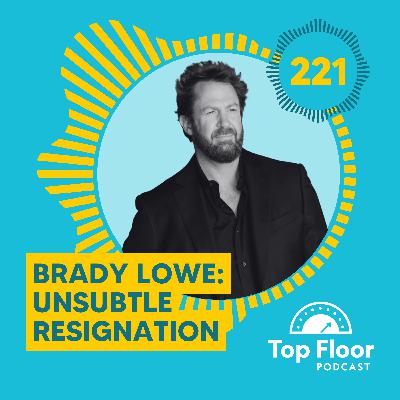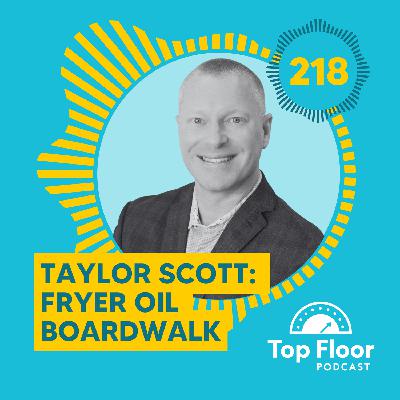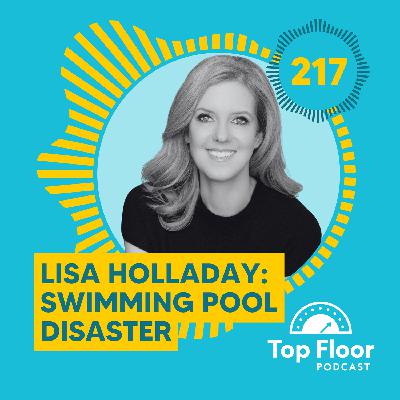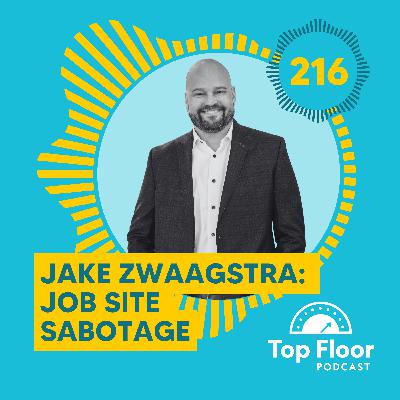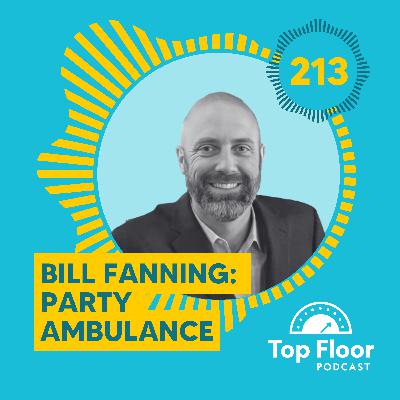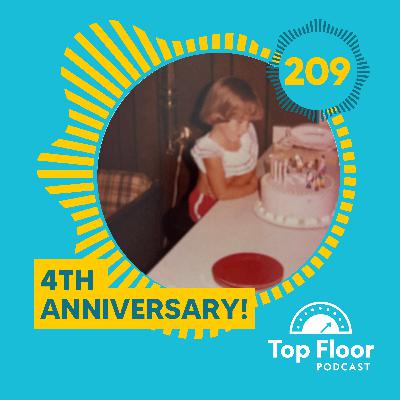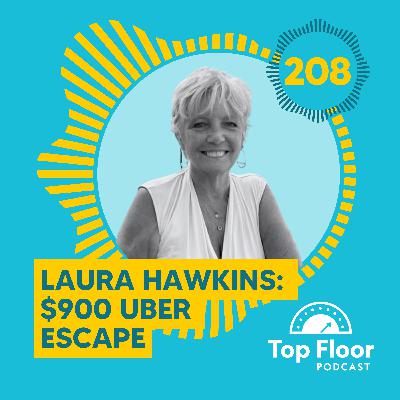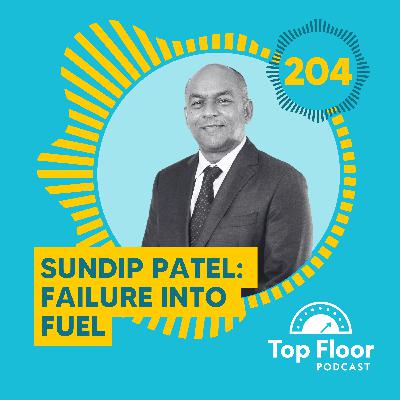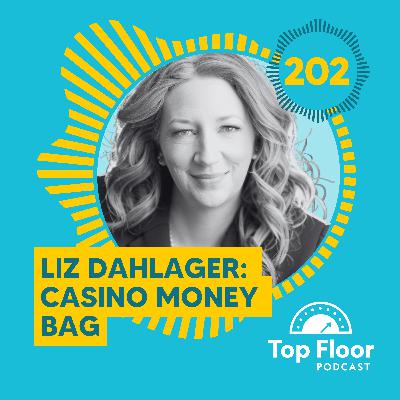Discover Top Floor
Top Floor

Top Floor
Author: Susan Barry
Subscribed: 1,223Played: 1,932Subscribe
Share
Copyright © Top Floor Podcast
Description
Top Floor is a weekly podcast with tangible tips and excellent stories from the experts and characters who elevate hospitality. Host and elevator operator Susan Barry explores the idea that everything is marketing in the hotel business.
Our interviews with creators, thought leaders and hospitality groundbreakers are designed to provide practical tactics that hoteliers, restaurateurs and travel mavens can use to promote their businesses. Along the way, we answer burning marketing questions submitted on the Emergency Call Button and share the funniest, craziest, just-plain-weirdest stories down at the Loading Dock.
Need to press the Emergency Call Button? Or have a story to share at the Loading Dock? Reach us at 850.404.9630 to be featured in a future episode.
Our interviews with creators, thought leaders and hospitality groundbreakers are designed to provide practical tactics that hoteliers, restaurateurs and travel mavens can use to promote their businesses. Along the way, we answer burning marketing questions submitted on the Emergency Call Button and share the funniest, craziest, just-plain-weirdest stories down at the Loading Dock.
Need to press the Emergency Call Button? Or have a story to share at the Loading Dock? Reach us at 850.404.9630 to be featured in a future episode.
222 Episodes
Reverse
Brady Lowe is a connector, educator, and experience-maker who founded Taste Network and the nonprofit Piggy Bank, spending more than two decades building unforgettable collaborations between chefs, farmers, hotels, and brands. Through his Next 10 coaching and accelerator hub, Brady helps hospitality founders design smarter events, deeper guest relationships, and sustainable revenue with a focus on pairings, playbooks, and pre-visit engagement. Susan and Brady chat during this special in-person episode, recorded at The Pub at EAV. • How to use Facebook groups, comments, and DMs to attract sports fans and turn them into faithful regulars • Why "11 to 35 micro-interactions" often have to happen before a guest spends a dollar with you • Ways to make your social media as personal and welcoming as your host stand or bar top • The origin story of Taste Network and how a single wine-and-cheese pairing can shape an entire career • How to think about guest engagement as "relationship currency" that carries your brand through tough times • What a strong pre-visit engagement sequence looks like for restaurants, hotels, and bars • Practical examples of surprise-and-delight moments that guests can replicate at home and rave about for months • How to turn recipes, rituals, and house favorites into high-value digital giveaways that build your email list • Why most hospitality social media fails (and what to ask your social media person about actual revenue) • How to download your Instagram data and use AI to audit what's working and who your real audience is • What to expect from the 2026 World Cup in terms of premium experiences, demand, and guest expectations • The key non-negotiables Brady uses to design memorable F&B experiences: surprise, emotional sequencing, and human connection *** Our Top Three Takeaways 1. Engagement before the visit is the new battleground for hospitality success. Brady argues that guest engagement must begin long before someone walks through the door. Restaurants and hotels should treat Instagram and their websites as extensions of the front door—places where you start building relationship equity. A simple "hello," a thoughtful comment, or an acknowledgment of someone's interaction can fundamentally shift how guests perceive your brand once they arrive. Most brands post but don't connect, and that is the biggest miss today. 2. Hospitality operators need training, tools, and intentionality around social media—and most don't have it. He's adamant that restaurants and hotels rarely train their teams to engage digitally. Social media isn't just a marketing channel; it's a hospitality channel. He encourages leaders to audit their digital presence, use tools like ChatGPT to evaluate Instagram data, create value-focused lead magnets (recipes, techniques, guides), and measure whether social efforts actually drive revenue. Without this skill set, the business model is incomplete. 3. First-time "transformational moments" are at the heart of memorable hospitality. From his earliest career epiphany—watching a guest have a life-changing food experience—to building Taste Network and Next 10, Brady centers everything around delivering unforgettable moments. His non-negotiables: surprise, carefully sequenced emotional storytelling, and genuine human connection. These principles apply whether you're designing an event, launching a restaurant, or building community—and they're key to earning loyalty and sustaining brands through peaks and valleys. Brady Lowe on LinkedIn https://www.linkedin.com/in/tastenetwork/ Taste Network https://tastenetwork.com/ The Pub at EAV https://www.eavpub.com/ Other Episodes You May Like: 129: Boo-Boo Sugar with Jason Brooks https://www.topfloorpodcast.com/episode/129 86: Fist Bump Welcome with Mary Mattson-Quagliana https://www.topfloorpodcast.com/episode/86 85: Fake Wedding Officiant with Michael Cecchi-Azzolina https://www.topfloorpodcast.com/episode/85
Michael Broadhurst is the Chief Operating Officer at StepStone Hospitality, a lifelong hotelier who sprinted from dish pit to nightclub manager to senior posts with Marriott, Starwood, Crestline, and Crescent. He opened the Westin Reston, later led the Westin Arlington Gateway, and built a reputation for turnarounds driven by culture, coaching, and cross-discipline training. Susan and Michael talk about teams, transitions, and top-line revenue. What You'll Learn About: • Why quick, personal, and approachable service beats fancy food every time • How learning Rooms turbocharges a hotel career • The Westin Arlington Gateway story—and how to revive a once-beloved flagship • Culture first: rebuilding teams before chasing scores and stars • When to walk away from an owner deal and the integrity lines you don't cross • Why management-company churn is rising, and how to avoid becoming a commodity • A step-by-step takeover playbook that calms nerves and kills rumors • Sales x Ops, not Sales vs Ops • The full-service future: experiential stays, destination F&B, and activated spaces • Solving owner–brand–operator misalignment *** Our Top Three Takeaways 1. Culture Comes First in Turnarounds When taking over a newly transitioned or underperforming hotel, Michael's first priority is always stabilizing the team and rebuilding culture. He emphasizes transparency, reassurance, and respect, meeting with associates early to address fears about job security, benefits, and pay. His philosophy mirrors the Marriott fundamental: take care of your associates, and they'll take care of your guests. 2. Integrity and Fit Matter More Than Growth Michael insists that StepStone walks away from deals that don't align with their values. He's clear that integrity and impact outweigh expansion, rejecting "numbers on paper" deals or partnerships without shared ethics. His approach to ownership relationships is built on honesty, ROI clarity, and long-term collaboration. He'd rather under-promise and over-deliver than chase short-term wins. 3. The Future of Full-Service Hotels Is Experiential Looking ahead, Michael predicts that full-service hotels will survive by becoming destinations, not just places to stay. Success will depend on differentiated experiences like vibrant F&B concepts, live entertainment, wellness and fitness activation, and localized service that connects emotionally with guests. He believes traditional "three-meal" models are obsolete; the new era of full service is about lifestyle, energy, and creating a sense of place that guests (and locals) seek out. Michael Broadhurst on LinkedIn https://www.linkedin.com/in/michael-broadhurst-13626b5/ StepStone Hospitality https://www.stepstonehospitality.com/ Other Episodes You May Like: 202: Casino Money Bag with Liz Dahlager https://www.topfloorpodcast.com/episode/202 193: Room for Trouble with Scott Roby https://www.topfloorpodcast.com/episode/193 112: No 7 AM Breakfasts with Leticia Proctor https://www.topfloorpodcast.com/episode/112
In this special episode of Top Floor, Susan talks with three founders whose products made this year's Hospitality Holiday Gift Guide. Michael Albert from Hotel Humor, Megan Grant Pederson from Cherish Tours, and Jim Higley from Puffer Hug each share the story behind their companies and why their creations make meaningful gifts for hoteliers, travelers, and hospitality pros. Tune in for cozy ideas, thoughtful experiences, and hospitality-themed treats for everyone on your list. Michael Albert on LinkedIn https://www.linkedin.com/in/michael-a-albert/ Hotel Humor https://hotelhumor.com Megan Grant Pederson on LinkedIn https://www.linkedin.com/in/megan-grant94/ Cherish Tours https://www.gocherishtours.com/ Jim Higley on LinkedIn https://www.linkedin.com/in/jimhigley/ Puffer Hug https://pufferhug.com/
Taylor Scott is a hospitality lifer turned leadership coach who cut his teeth at Walt Disney World, led sales at Disney Vacation Club, and earned his MBA from Cornell's Hotel School. He's the author of Lead with Hospitality and the leadership fable Give Hospitality, translating world-class service principles into practical playbooks for teams. Susan and Taylor talk about connection, culture, and coaching. What You'll Learn About: • Why "don't reply to everything" is terrible leadership advice. • How sales and leadership mirror each other: build trust fast, influence behavior faster. • The Connect–Serve–Engage–Inspire framework you can run on a busy lobby shift. • LEAD as a service checklist: Listen, Educate, Act, Deliver. • The mindset shift from SOP security blanket to entrepreneurial trial-and-error. • Grad school's real ROI: "building shelves" in your brain + a global network. • How to lead high achievers with the 3 C's: Choice, Competence, Community. • "Guest first, team always" and "Purpose over policy" as decision filters. • Turning fear-based flailing (hello, mushroom panic) into guest-centered choices. • Why the next leadership frontier is re-teaching human connection in an AI world. Our Top Three Takeaways 1. Leadership and Sales Share the Same Core: Connection and Influence Taylor makes the case that sales is leadership, and leadership is sales. In both roles, success depends on making people trust and like you quickly, then inspiring them to take action. His "Lead with Hospitality" framework — Connect, Serve, Engage, Inspire — provides a clear path for achieving this in daily operations: connect with people on a human level, serve them first, engage with generosity and purpose, and inspire them through storytelling and authenticity. 2. The Best Leaders Create Environments for Motivation Drawing from the self-determination theory, Taylor explains that people become self-motivated when they experience choice, competence, and community — his "three C's." High achievers, in particular, thrive when leaders give them autonomy, recognize their expertise, and foster a sense of belonging. Leadership isn't about control; it's about designing the conditions where people can thrive. 3. Purpose Over Policy: Leading with Humanity From his experiences at Disney and Cosmopolitan, Taylor emphasizes two enduring leadership mantras: "Guest first, team always" and "Purpose over policy." Great leaders prioritize people and purpose over rigid rules, empowering teams to make guest-centered decisions. As hospitality evolves with AI and generational change, Taylor predicts the next frontier of leadership will be relearning how to connect on a human level — teaching empathy, conversation, and connection in an increasingly digital world. Taylor Scott on LinkedIn https://www.linkedin.com/in/tscott1502/ Lead with Hospitality https://leadwithhospitality.com/ Other Episodes You May Like: 179: Bridal Suite Sweethearts with James Ferguson https://www.topfloorpodcast.com/episode/179 118: Grief-Stricken Audience with Christine Trippi https://www.topfloorpodcast.com/episode/118 129: Boo-Boo Sugar with Jason Brooks https://www.topfloorpodcast.com/episode/129
Lisa Holladay is the first Chief Experience Officer at TIGER 21, where she crafts learning, access, and connection for a global community of ultra-high-net-worth, largely first-generation entrepreneurs. Formerly the global brand leader for The Ritz-Carlton and a luxury portfolio lead at Marriott, Lisa brings a rare guest-centric lens to designing unforgettable moments online and off. Susan and Lisa talk about privacy, personalization, and peer-to-peer power. What You'll Learn About: • How Shakespeare and student teaching shaped Lisa's storytelling superpowers • The pantyhose policy heard 'round the world • Why "over-engineered" hotel rooms (hi, mystery nightlights) kill delight • Turning virtual events from sleepy streams into sparky, small-group salons • TIGER 21's Learn–Access–Connect framework for members who "have everything" • Designing money-can't-buy moments (like lunch on a Costa Rican cane-sugar farm) • Hosting without being subservient: "ladies and gentlemen serving ladies and gentlemen," updated • Measuring what matters: retention, sold-out events, and the "you can feel it" factor • The next luxury frontier: invisible security and privacy as core experience • Breaking the ballroom mold—escaping the sea of sameness in event design Our Top Three Takeaways 1. Storytelling and Empathy Are the Heart of Hospitality Lisa traces her career from Shakespearean acting to luxury marketing, showing that storytelling, performance, and understanding your audience are universal skills. Whether crafting a brand narrative or leading a guest experience, she believes the best hospitality professionals think like empathetic storytellers—anticipating needs, creating emotional resonance, and delivering "the right kind of drama." 2. Exceptional Experiences Are Built on Authenticity and Human Connection From Ritz-Carlton to Tiger 21, Lisa emphasizes that the most meaningful luxury isn't opulence—it's authenticity, access, and connection. At Tiger 21, she and her team design "money-can't-buy" moments that surprise even ultra–high-net-worth members, like an unglamorous but deeply human visit to a family-run cane sugar farm. Whether at a five-star resort or a midmarket hotel, she believes memorable experiences come from personal touches, genuine local insight, and small gestures that foster belonging. 3. The Future of Luxury Is Privacy, Security, and Individualization Lisa predicts that true luxury will soon be defined by safety and discretion as affluent travelers become increasingly protective of their digital and physical privacy. She calls on the industry to go beyond superficial personalization and cookie-cutter design—to innovate around invisible service, security, and emotional intelligence. Her "magic wand" wish is to see hospitality move away from sameness and toward transformative, one-of-a-kind experiences that feel both safe and singular. Lisa Holladay on LinkedIn https://www.linkedin.com/in/lisaholladay01/ TIGER 21 https://tiger21.com/ Other Episodes You May Like: 165: Purple Flower Luxury with Florence Li https://www.topfloorpodcast.com/episode/165 210: Six Months at the Waldorf with Josh Kremer https://www.topfloorpodcast.com/episode/210 29: Buzz Sawed Tables with Marc Eliot https://www.topfloorpodcast.com/episode/29
Jake Zwaagstra is the CEO of TriCelta Development and a veteran builder of complex hospitality projects from the Las Vegas Strip to tribal mega-developments. He's worked both GC-side and owner-side, translating vision into budgets, drawings into buildings, and chaos into opening days. Susan and Jake talk about function over flair and momentum over mayhem. What You'll Learn About: • The owner's-eye view that changes everything about building • Lessons hotel development can steal from nuclear projects • The real difference between a project manager and a development manager • What developers actually do day to day on hotel builds • Smart ways to stay ahead of supply-chain chaos • Why front-desk mockups save years of operator frustration • The three-part formula for better design decisions • How model rooms power everything from IT to marketing • Why tech-forward hotels still need human touch • How to rescue a luxury project from $1,100-per-foot wallpaper Our Top Three Takeaways 1. Development Management Is More Than Construction Jake distinguishes development management from project management—it's about guiding the project from concept to completion, not just managing timelines and contractors. His team's role is to translate an owner's vision into an operationally sound, financially viable, and buildable reality. They stay several steps ahead of potential roadblocks—whether that's tariffs, supply chain issues, or union disputes—to keep the project moving and protect the owner's investment. 2. Function and Long-Term Operations Trump Aesthetics Jake's philosophy is clear: never "value engineer" something that affects the operator's ability to run the property. Early decisions—like front desk ergonomics, model room mockups, and material choices—should be made with the day-two operator in mind. He prioritizes function over form, lead time over looks, and performance over preference to ensure hotels are built to operate smoothly and sustainably long after the ribbon-cutting. 3. Communication and Accountability Are the Secret Weapons Lessons from outside hospitality, such as his experience building a nuclear enrichment facility, reinforced Jake's belief in over-communication and structured accountability. His "Plan of the Day" approach—daily 15-minute check-ins to clarify goals and track follow-through—keeps massive projects aligned and moving. That same mindset applies to hospitality development: clear expectations, daily progress, and follow-up ensure no one loses sight of the big picture, even on complex, multi-year builds. Jake Zwaagstra on LinkedIn https://www.linkedin.com/in/jacob-zwaagstra/ TriCelta Development https://www.triceltadevelopment.com/ Other Episodes You May Like: 57: Teddy Ruxpin Witchcraft 🧸🧙♀️ with Renee Bagshaw https://www.topfloorpodcast.com/episode/57 167: Compost, Compost, Compost with Amy Wald https://www.topfloorpodcast.com/episode/167 119: Never Check Bag with Scott Lamont https://www.topfloorpodcast.com/episode/119
Ashley Ching is the founder and CEO of InHaven, a company standardizing vacation rentals with hotel-grade essentials and service. After 13 years at Tiffany & Co., she saw how consistent standards create unforgettable experiences and brought that rigor to short-term rentals. Susan and Ashley talk about standards, scale, and service. What You'll Learn About: • How a free research study can turbocharge credibility, conferences, and customers • What Tiffany's playbook taught Ashley about pairing consistency with authenticity • How Westin's Heavenly Bed reset guest expectations across an entire industry • The five pillars great operators share—and the warning signs when each starts wobbling • How grouping by shared demand drivers sharpens ops and marketing • Why too many owners tank speed, focus, and sanity • Why empowered on-the-ground pros outdeliver policy-bound HQs • How hospitality hits dis-economies of scale and where the hidden labor costs lurk • How a new vacation-rental quality framework helps guests know what they're booking Our Top Three Takeaways 1. Consistency + Authenticity = Guest Trust Ashley draws on her Tiffany & Co. background to show that hospitality success hinges on balancing certainty (clear, dependable standards) with authenticity (local character and uniqueness). Just as Westin's Heavenly Bed redefined consistency in hotels, In Haven is working to create a reliability framework for vacation rentals so guests know what to expect without losing the charm of individual homes. 2. The Five Pillars of Successful Hospitality Management From her case study of Vacasa, Aimbridge, and decades of roll-ups before them, Ashley identified five pillars that predict whether management companies succeed or fail: Curated portfolio (avoiding too many "bad apples"), Properties grouped by similar demand drivers, Limited number of owners, Local-oriented operations, Empowered hospitality professionals. When these pillars erode—especially through over-centralization or owner overload—companies face churn, brain drain, and eventual collapse. 3. Bigger Isn't Always Better: Diseconomies of Scale in Hospitality Contrary to the industry's obsession with scale, Ashley's research shows that large property managers often face rising costs rather than savings. Unlike manufacturing, where size brings efficiency, hospitality is labor-intensive and complexity grows with scale. More units mean more staff layers, owner demands, and overhead—leading to diseconomies of scale instead of the promised efficiencies. Ashley Ching on LinkedIn https://www.linkedin.com/in/ashley-ching-inhaven-b56a843/ InHaven https://inhaven.com/ GET THE CASE STUDY HERE https://inhaven.com/case-study/ Other Episodes You May Like: 145: Chamber of Commerce with Alex Alioto and Noel Russell https://www.topfloorpodcast.com/episode/145 48: Go At It Boldly with Alex Husner and Annie Holcombe https://www.topfloorpodcast.com/episode/48 106: Hot Tub Bandits with Annie Sloan https://www.topfloorpodcast.com/episode/106
Al Lagunas is the co-founder of Levee, an AI-driven vision-and-voice platform that converts room inspections into verified data and automated workflows. A first-generation Mexican American from Chicago, Al's people-first lens was shaped by his mom's hotel housekeeping career. Susan and Al talk about pitching, personalization, and productivity. What You'll Learn About: • How physical and digital products sell differently • Lessons from scaling a startup • The people-first lens Al brings from his family's housekeeping roots • "Time to Value" as the overlooked metric in hotel ops • How Levee's one-button vision and voice AI verifies room setup • Real-time feedback that gets new housekeepers to three-month performance by their fourth room • Closing the personalization fulfillment gap • The near-future mix of human teams plus AI agents and robotics Our Top Three Takeaways 1. Time to Value Is More Important Than "Training Time" Al reframed the industry's labor challenge: the real problem isn't a shortage of workers, but how quickly hotels can turn new hires into valuable contributors. Instead of focusing on a 10–20 day training period, operators should measure "time to value"—how fast a team member begins producing quality work. Using Levy's AI-assisted inspections, new housekeepers reached the performance level of 3–6 month veterans after cleaning just four rooms, which radically reduces onboarding friction. 2. Personalization Requires Operational Fulfillment, Not Just Data Guest personalization has long been a "white whale" in hospitality, but Al emphasized that data alone isn't enough. Knowing a guest's coffee preference or pillow type doesn't matter unless the front-line team can reliably act on it. Levy addresses this by making room setup checklists dynamic and verifiable, turning guest data into consistent fulfillment. This shifts personalization from an abstract idea to a repeatable process embedded in daily operations. 3. The Workforce of the Future Will Be People + AI Agents Al predicts that hotel back-of-house teams will evolve into a hybrid workforce of humans, AI agents, and robotics. Instead of viewing AI as a replacement, he sees it as an extension of labor—helping staff complete inspections, surface data, and automate tasks. This diversification enables leaner, more efficient teams while also opening the door for new types of roles and responsibilities as hospitality operations modernize. Al Lagunas on LinkedIn https://www.linkedin.com/in/allagunas/ Levee https://www.levee.biz/ Other Episodes You May Like: 206: Cater Waiter Diss with Steven Moore https://www.topfloorpodcast.com/episode/206 105: Front Desk Romance with Nima Anvar https://www.topfloorpodcast.com/episode/105 54: Surprise Platter with Stephen Burke https://www.topfloorpodcast.com/episode/54
Bill Fanning is an Austin-based software leader turned hospitality-tech exec who's led revenue and sales across VC-backed, public, and PE-owned companies. After falling for the community-building power of restaurants and hotels, he brought his scale-with-discipline mindset to Stayntouch, a PMS for independent hotels and multi-property portfolios. Susan and Bill talk about tech rollouts without heartburn and career pivots with purpose. What You'll Learn About: • How different funding models shape company growth. • Why hotels and restaurants are the original social networks. • What drove Bill from social media into hospitality tech. • What it takes to roll out 140 hotels in 90 days. • Why culture change is harder than technology change. • Why listening beats talking in sales. • Why hospitality expertise matters in selling software. • How AI may reshape hotel tech—and where it falls short. • Why hotels resist new tech and how that's changing. • How hotel skills translate into careers beyond the industry. Our Top Three Takeaways 1. Hospitality as the Original Social Network Bill highlighted that long before digital platforms, restaurants and hotels served as true community builders—what he calls the "OG social media." These spaces create authentic human connection, culture, and shared experiences in ways that digital networks can't replicate. His career shift from social media technology into hospitality tech reignited his passion for building community through real-world venues. 2. Sales Skills Are Transferable, but Domain Expertise Matters While strong sales fundamentals—communication, listening, negotiation—apply across industries, selling strategic hospitality software requires a deep understanding of hotel operations. Bill emphasized that hoteliers often underestimate the value of their own experience: running complex properties gives them an expertise that's far more difficult to teach than sales technique. He believes hospitality professionals can thrive in tech by pairing their domain knowledge with learned sales skills. 3. Tech Change Is About Culture, Not Just Software When hotels adopt new property management systems (PMS), the biggest hurdle isn't the technology itself but the cultural change required to embrace new processes. Intuitive design, hands-on training, and creating internal champions are key to adoption. Looking ahead, Bill predicts AI will accelerate tech development, but he cautions against replacing human support with bots too quickly—hospitality still depends on personal, human connection. Bill Fanning on LinkedIn https://www.linkedin.com/in/billfanning1/ Stayntouch https://www.stayntouch.com/ Other Episodes You May Like: 103: Comedy Legend Thwarted with Jeanelle Johnson https://www.topfloorpodcast.com/episode/103 133: Stranded in the Rain with Frank Reeves https://www.topfloorpodcast.com/episode/133 98: Snapped Tow Rope with Craig Everett https://www.topfloorpodcast.com/episode/98
Debbie Feldman literally grew up in hotels—her father founded Embassy Suites—and she's since worn almost every hat: GM, asset manager of a 45-hotel portfolio, and co-founder of TCOR Hotel Partners. She's led high-profile repositionings (hello, Fairmont Copley Plaza) and recently teamed with Hotel B School to build a pragmatic course on hotel investment. Susan and Debbie talk about buying basics, budget brass tacks, and booking blend. 🔔 Call Button Q: When staff ask, "Is the hotel for sale?"—lead with candor. 🎓 From GM to DOS (on purpose): Debbie took a "demotion" into sales to prove she could do it—and did. 🧾 Revenue vs. profit reality check: Early in her career, even as a GM, she admits the focus stopped at GOP. 🛑 Brand showdown: As an asset manager, Debbie hired an outside sales trainer for brand-managed hotels, got a cease-and-desist… then watched the brand adopt the same trainer chain-wide. 💸 How her group dodged COVID cash calls: Maxed every eligible relief program early, kept leverage conservative (~65%), and worked closely with a relationship lender for forbearance. Discipline > drama. 🏫 Hotel B School course—who it's for: GMs who want to speak "owner," ops pros eyeing the real-estate side, and commercial leaders (sales/rev) aiming at development. 📈 Rate, occupancy & flow-through—what owners actually want: It's not "team rate" or "team occupancy." 🧠 Deal thesis 101 for GMs: Know the hold period, cap rates, and likely exit timing so your capital asks match ownership's lifecycle. 🪄 Debbie's magic wand for NOI: Win more lowest-cost demand—local negotiated accounts + direct/brand-site booking. Our Top Three Takeaways 1. Owners Value Transparency and Alignment Debbie emphasized that honesty is always the best policy when staff ask tough questions, like whether a hotel is for sale. She explained that owners prefer to retain staff through transitions and often provide incentives for key leaders to stay on board. 2. Think Like an Owner, Not Just an Operator A recurring theme was the importance of GMs and property-level leaders understanding ownership concepts like hold periods, debt service, NOI, and cap rates. Debbie pointed out that too many managers stop at GOP on the P&L without considering debt, taxes, or insurance. She advised that showing up "like an owner" requires tracking those below-the-line costs and making decisions that reflect the deal thesis, not just short-term RevPAR growth. 3. The Path from Hotel Ops to Ownership is Possible and Teachable Debbie's own career path, from GM to asset management to ownership, underscored that crossing into the investment side of hospitality is achievable. She created the Hotel B School course to help GMs, revenue leaders, and others make that leap. The course demystifies ownership jargon (IRR, debt service coverage, cap rates) and provides the tools to interview well and contribute strategically. For aspiring owners, the key is moving beyond operations to truly understand how hotels make money for investors. Debbie Feldman on LinkedIn https://www.linkedin.com/in/debbie-feldman-2932203/ TCOR Hotel Partners https://tcorhp.com/ Hotel B School https://hotelbschool.com/hotel-real-estate/ Other Episodes You May Like: 181: Smoky Light Pole with Tommy Beyer https://www.topfloorpodcast.com/episode/181 184: Hotel Room Saddle with Lan Elliott https://www.topfloorpodcast.com/episode/184 175: $7,000 Vacuums with Micajah Sturdivant https://www.topfloorpodcast.com/episode/175
Mike Messeroff spent three decades in hospitality and was JetBlue's first intern before swapping corporate partnerships for a life of travel and a career behind the bar. A low point in paradise led him to mindfulness, daily meditation, and ultimately leadership coaching for hospitality executives. Today, he's launching the Self Hospitality Collective, offering bite-sized audio guidance and practical practices for leaders. Susan and Mike talk about meditation, mindfulness, and modern management. What You'll Learned About: • JetBlue's first intern by "accident"? Mike turns a chance aisle chat with the CEO into a career. • Daydreaming of beach life? Mike says you'll pack your baggage either way, so do the inner work first. • Breckenridge paradox: daily skiing + dream town ≠ joy; anxiety became the wake-up call. • "Happiness is uncaused." (Yes, that line stops the show—and your doom-scroll.) • Self Hospitality = treating yourself like the VIP in your lobby: restocked, respected, and not running on fumes. • Meditation is non-negotiable. Even 3 minutes builds that "magic gap" between trigger and response. • Gratitude hack: you can't be stressed and thankful at the same time. • For the "no-woo" crowd: real-world ROI—lower cortisol, better focus, fewer dish-smashing meltdowns. • Micro-practices for brutal days: one conscious breath, a three-minute reset, a mindful reminder ("I'm here to solve problems"). Our Top Three Takeaways 1. Inner Work Comes Before Outer Change Mike's story shows that changing your surroundings, whether by moving to a beach in the Caribbean or skiing daily in Colorado, doesn't guarantee happiness. Wherever you go, you bring yourself with you. True fulfillment comes from addressing patterns like negative self-talk, stress, or self-medication. External shifts may feel exciting, but without the inner work, they won't resolve deeper struggles. 2. Self-Hospitality Is Essential for Leaders Mike's concept of self hospitality is about treating yourself like your most honored guest. Just as hoteliers go above and beyond for VIPs, leaders should extend that same care inward: practicing consistent meditation (even for just three minutes), cultivating gratitude, setting clear boundaries, and pursuing personal passions. When leaders nurture themselves, they can give from a place of overflow rather than depletion—ultimately benefiting their teams, guests, and organizations. 3. Joy and Happiness Are Our Natural State Mike emphasizes that happiness is "uncaused," meaning we are born joyful, but stress, fear, and external pressures layer over it. Through mindfulness practices like meditation and gratitude, leaders can reconnect with that natural state and create a "magic gap" between stress and response. This not only prevents burnout but also models healthier, more sustainable leadership in an industry prone to overwork and high stress. Mike Messeroff on LinkedIn https://www.linkedin.com/in/mikemesseroff/ The Carpe Diem Company https://www.mikemesseroff.com/ Other Episodes You May Like: 130: Guard Dog Negotiations with Melissa Maher https://www.topfloorpodcast.com/episode/130 88: Dating App Surprise with Karen Laos https://www.topfloorpodcast.com/episode/88 192: Fluff and Fold with Shelley Brown https://www.topfloorpodcast.com/episode/192
Josh Kremer is the co-founder of Paradero Hotels, a Baja-born luxury brand blending boutique resorts with destination management to create immersive, off-grid experiences. A classically trained chef who pivoted into real estate private equity, Josh brings both palate and P&L to building small-scale, high-touch hospitality. Susan and Josh talk about remote resorts, resourceful resourcing, and refined service. What You'll Learn About: • From chef whites to term sheets: Josh Kremer's zigzag from kitchens to Blackstone to founding Paradero Hotels. • Why "experiential luxury" beats "bikinis + margaritas," and how Paradero designs trips that spill far beyond the property line. • Off-beach on purpose: picking a site framed by five ecosystems to unlock creative freedom (and way better adventures). • Oasis IRL: how Baja's mountains create desert lagoons—and a top birdwatching haven—without cartoon mirages. • The unsexy backbone of remote hospitality: fiber pulls, buried power lines, backup gen, daily procurement runs, and a fleet of guide-led vehicles. • Scale by listening: adults-only → groups/events → families → homes; growing to 92 keys while keeping density low. • Where guests are pointing next: Riviera Maya (not in Cancun), Riviera Nayarit, plus eyes on Oaxaca, San Miguel, and Valle de Guadalupe. • Hiring where others won't: local-first, import managers when needed, and invest in great staff housing for a "soft landing." • The 10x Rule: whatever effort you think it'll take, multiply by ten (site selection alone jumped from ~20 to 800!). • A perfect Paradero day: sunrise views → surf coaching → chef-driven breakfast → pool + temazcal → farm tasting → cliffside sunset → stargazing net. 1. Expect 10x More Work Than You Think Josh stresses what he calls the "10x rule": however much effort you think a project will take, multiply it by ten. From evaluating 800 sites before selecting one to interviewing 20 architects before choosing a partner, the reality of launching a hospitality venture is far more demanding than anyone could have anticipated. The lesson applies broadly: if you're starting something ambitious, prepare for an order of magnitude more persistence, patience, and problem-solving than your first instinct suggests. 2. Culture Shapes Business—and Guest Experience Having lived in both Mexico and the U.S., Josh highlights how family-centric culture in Mexico contrasts with the U.S.'s emphasis on individualism. Understanding and respecting those differences helps him build both teams and guest experiences. The broader takeaway: Leaders who work across borders, or even within different communities, need to tune in to local cultural values. This can guide not only how you manage staff but also how you design meaningful customer experiences. 3. Operating in Remote or Nontraditional Locations Requires Creative Infrastructure Running a semi-remote property is as much about mastering logistics as it is delivering luxury. Josh described pulling fiber from a distant city, burying power lines to protect the guest experience, and organizing daily supply runs. The big lesson is that unconventional opportunities often require unconventional solutions. If you're drawn to an out-of-the-box idea, success may depend on investing early and heavily in the unglamorous operational backbone. Josh Kremer on LinkedIn https://www.linkedin.com/in/joshua-kremer-bb904a26/ Paradero Hotels https://www.paraderohotels.com/ Other Episodes You May Like: 159: 15-Day Career with Gustavo Viescas https://www.topfloorpodcast.com/episode/159 165: Purple Flower Luxury with Florence Li https://www.topfloorpodcast.com/episode/165 74: Calm and Nurturing Ghost with Trisha Pérez Kennealy https://www.topfloorpodcast.com/episode/74
Happy anniversary, Top Floor! Calvin Tilokee is the founder and creative director of RevPAR Media, blending 20+ years of revenue management and marketing with a sharp creative streak. Known for illuminating hospitality brands and roasting industry quirks with his beloved hotel-meme persona, @revparblems, Calvin bridges data, strategy, and humor. On this anniversary episode, he flips the script as guest host, guiding a lively tour through pandemic pivots, podcast production, and personal pet peeves. What You'll Learn About: • Where Susan found the nerve to launch a business without a cash cushion or safety net. • Calvin's own origin story: furlough → pandemic pivot → RevPAR Media, full steam ahead. • The birth of Top Floor: from "Going Up" to the brand you know (and why the original name got nixed). • Why the show expanded beyond marketing, and why that makes it more fun (and nosier). • Production secrets: heavy prep, tight edits, and Susan's biggest guest pet peeves. • The fan favorites everyone mentions: the sister episodes (aka laugh tracks with plot). • What's next: more episodes, collabs, maybe a digital magazine, and some video—selectively. • Dream guests: Cindy Gallop and Sara Blakely (manifesting!). • Big swings Susan wants to try: investigative series + hospitality history deep dives. • Legacy goal: helping pros discover dream roles they didn't know existed. • Three Loading Dock stories for the price of one… but you'll have to listen for that. Our Top Three Takeaways: 1. Entrepreneurship isn't about perfect timing or eliminating all risk. Susan launched Hive Marketing in 2009 without savings or a safety net, betting that the chaos of the financial crisis made "failure" reputationally safe, and she's never looked back. 2. Top Floor's edge is curiosity + craft. The show evolved from a marketing niche to a "curiosity cabinet" for the entire hospitality industry, staying audio-first with tight editing and meticulous preparation, and measuring success by growing influence and genuine relationships. 3. The next chapter is expansion and experimentation. Susan's eyeing more episodes, collaborations, a digital Top Floor magazine, selective video/live moments, and investigative or history-of-hospitality series, aiming to surface hidden career paths and inspire listeners while the industry modernizes to match guest behavior. Calvin Tilokee on LinkedIn https://www.linkedin.com/in/calvintilokee/ RevPAR Media https://www.revparmedia.com/ Susan Barry on LinkedIn https://www.linkedin.com/in/susandbarry/ Hive Marketing https://www.hive-marketing.com/ Top Floor https://www.topfloorpodcast.com/ Female Founders in Hospitality https://femalefoundersinhospitality.com/ Cindy Gallop's Brain-Altering HBR Article https://hbr.org/2022/04/stop-criticizing-women-and-start-questioning-men-instead Other Episodes You May Like: 03: Dude, Calm Down with Calvin Tilokee https://www.topfloorpodcast.com/episode/03 53: It's Your Birthday 🎂 https://www.topfloorpodcast.com/episode/53 Playlist: Shenanigans https://www.topfloorpodcast.com/episode/category/Shenanigans
Laura Hawkins is the founder of Gamemasters Escape Solutions, a creator and operator of high-performing escape rooms for hotels and resorts. After a successful career making viral television advertising, she discovered escape rooms on a European trip. She turned a passion project into a 14-room operation and a turnkey hotel amenity business (including installs at Atlantis, The Bahamas). She joins us to talk revenue, resorts, and escape room design. • Budget-season hot take: maximize social first and add hyper-targeted print ads if you have the cash. • From receptionist to rainmaker: Laura hustled her way off the front desk and into award-winning ads. • "Just Slow Down": the graphic traffic-safety campaign that made her the Quentin TarantinA of Winnipeg. • Vacation plot twist: one so-so Dublin escape room → Athens upgrade → Paris hook → new career. • Resorts love it: low staff, durable props, and constant revenue. • Corporate catnip: team-building, communication, respectful-collaboration—plus a true differentiator vs. the hotel next door. • Design recipe: theme first → story → tactile puzzles (knobs, secret doors, scents)… and yes, limes. • Player pro tip: communicate, inventory the space, and OPEN. THE. DRAWERS. Our Top Three Takeaways: 1. Escape Rooms Are a High-ROI Amenity for Hotels and Resorts Laura emphasized that escape rooms offer hotels a unique way to generate revenue while differentiating from competitors. Unlike spas or waterparks, escape rooms appeal to a wider demographic—from families with young kids to teenagers, grandparents, wedding parties, and corporate groups. They're low-labor, durable, and cost far less to install and maintain, while still driving constant guest traffic and ancillary spending at restaurants and bars. 2. Immersive Entertainment Strengthens Guest Connection For Laura, the heart of escape rooms is shared experience. Guests disconnect from screens, collaborate face-to-face, and leave with stories they'll continue discussing long after the game. This creates a sense of joy and connection that builds loyalty and word-of-mouth—two of the strongest assets for hotels seeking repeat visits and community engagement. 3. Differentiation Requires Courage and Creativity Laura challenged hotels to show more boldness in shaping guest experiences. Too many properties look the same, leaving price as the only deciding factor. By embracing immersive, playful, and customizable amenities—like themed escape rooms or even immersive dinner theater—hotels can stand out, create memorable stays, and deliver new revenue streams. Laura Hawkins on LinkedIn https://www.linkedin.com/in/laura-hawkins-40543319b/ Gamemasters Escape Solutions https://www.gamemastersescapes.com/ Escape Room Atlantis https://www.atlantisbahamas.com/escape-room First-Person Experience at Atlantis https://www.tiktok.com/@znsdigital/video/7512226338397359365 Escape Room Video https://www.youtube.com/watch?v=EOcy5xGcHu8 Just Slow Down viral ad https://www.youtube.com/watch?v=9HppFNyqVOI Other Episodes You May Like: 168: Celery in the Hoodie with Paul Bishop https://www.topfloorpodcast.com/episode/168 172: Pandemic Survivor Couple with Geetika Agrawal https://www.topfloorpodcast.com/episode/172 101: Hedge Clipper Disaster Averted with Elysia Burns https://www.topfloorpodcast.com/episode/101
Agnelo Fernandes is the CEO of Cote Hospitality, a company blending resorts and heritage summer camps into unforgettable indoor-outdoor experiences. His career spans the Caribbean, Canyon Ranch, CoralTree, and beyond, where he's built brands, launched properties, and reshaped cultures. Susan and Agnelo talk about culture, camps, and compassionate leadership. - Why culture is less about ping pong tables and more about tiny, human moments. - How planning a conference set him free. - What he learned from Canyon Ranch: branding isn't logos, it's promises kept. - Why kids are better at reviewing travel experiences. - Where Agnelo spends 60% of his time. Our Top Three Takeaways: 1. Culture Is Built Through Small, Human Moments Agnelo says, "Mindset drives everything." He emphasized that workplace culture isn't about perks or slogans but about how people feel when they aren't being watched. Leaders should focus on the details: knowing employees' families, celebrating milestones, listening during "culture rounds," and replacing blame with curiosity. He believes culture grows out of conversations and small, consistent acts of care. 2. Authenticity and Empathy Define Great Hospitality From his time at Canyon Ranch and beyond, Agnelo learned that branding is really about keeping promises and creating experiences. Whether with guests or associates, authenticity and empathy matter most. He stressed that leaders should train teams with real-life, situational examples and that the best way to ensure great guest experiences is by prioritizing and empowering staff first. 3. The Future of Hospitality Blends Purpose, People, and Outdoor Connection Agnelo predicts strong growth in outdoor hospitality, with travelers seeking meaningful disconnection and reconnection with people they love. He also shared advice for leaders and entrepreneurs: cultivate the right mindset, listen deeply, embrace failures as part of growth, and remember that true hospitality is about enriching lives. Agnelo Fernandes on LinkedIn https://www.linkedin.com/in/agnelofernandes/ Cote Hospitality https://www.cotehospitality.com/ Other Episodes You May Like: 77: GM in the Dumpster with Eleanor Erickson https://www.topfloorpodcast.com/episode/77 179: Bridal Suite Sweethearts with James Ferguson https://www.topfloorpodcast.com/episode/179 35: Ice Machine Bandit with Trina Notman https://www.topfloorpodcast.com/episode/35
Steven Moore is the CEO of Actabl, a hospitality operations platform uniting four hotel operations tools into one streamlined solution. From his early days as a catering busboy to leading Transcendent through the pandemic, Steven's career has exposed him to more than one challenging situation. Susan and Steven talk about crisis leadership, labor challenges, and competition. What You'll Hear About: Why "over-respecting" a crisis beats pretending everything's fine. The unexpected CNBC debut that taught Steven the power of saying yes. Why hotel tech can be a hot mess of fragmentation. Why "no silver bullet" doesn't mean labor problems can't be solved. How gamifying hotel engineering boosts employee retention. Steven's bold prediction: the death of single-workflow vendor tools in five years. Our Top Three Takeaways: 1. Lead with data and quick wins when driving change Whether selling tech to hoteliers or encouraging adoption inside a hotel company, success comes from proving ROI with clear, relevant data and starting small. One quick, tangible win builds credibility and opens the door to broader adoption. 2. Over-respect a crisis Steven's COVID-era CEO experience reinforced the need to anticipate that crises may be more painful and longer-lasting than expected, communicate more frequently, prepare for universal skills like clear thinking and empathy, and balance realism with inspiring optimism. 3. Balance long-term vision with near-term pressures Steven's time in a family office taught him to think in decades, planting "oak trees" today to enjoy the shade later. In a fast-paced, urgent hospitality environment, he stresses the importance of making sustained, compounding investments while still meeting short-term demands. Steven Moore on LinkedIn https://www.linkedin.com/in/steven-moore-80b4ba1a/ Actabl https://actabl.com Other Episodes You May Like: 95: Human Chat Bot with Omri Shalev https://www.topfloorpodcast.com/episode/95 135: Giant Pink Eraser with Brian Miller https://www.topfloorpodcast.com/episode/135 11: Swedish Pastry Dreams with Tracy Judge https://www.topfloorpodcast.com/episode/11
Wil Slickers is a hospitality pro turned podcasting powerhouse. He launched Slick Talk in 2018 to scratch an industry itch, then turned it into a multi-show media empire with Hospitality FM, recently acquired by Skift. Susan and Wil talk about podcast pivots, media mergers, and the messy magic of microphone mastery. What You'll Hear About: 🎙️ Why wearing headphones matters, even with a fancy mic 🎙️ When a sponsor email changed everything 🎙️ Why Wil sold Hospitality FM to Skift 🎙️ What changes are coming to hospitality media 🎙️ How to launch a podcast that doesn't sound like everyone else's 🎙️ Why smart money matters more than easy money 🎙️ What to avoid in marketing: stock photos, stuck messaging 🎙️ Where things got wild: a hotel checkout story involving blood, blow-up dolls, and a weird whisper Our Top Three Takeaways: 1. Be Original Whether you're building a podcast network or a hospitality business, success starts with knowing who you are and what you stand for. Wil's experience growing and selling Hospitality.FM shows the power of having a clear, unapologetic point of view. Steer clear of the same old stock photos and podcast formats. 2. Long-Term Thinking Beats Short-Term Wins In both content and hospitality, it's tempting to chase quick results, but real growth happens when you play the long game. Wil built trust with creators and brands by investing in consistency, quality, and relationships rather than shortcuts. Easy money can be surprisingly expensive. 3. Persist When things weren't going well, Wil focused on his "why" and gave himself permission to evolve instead of quitting. He believes persistence isn't about pushing harder. It's about being honest, staying curious, and adjusting your path while staying true to your mission. Wil Slickers on LinkedIn https://www.linkedin.com/in/wil-slickers/ Hospitality.FM https://hospitality.fm/ Acquisition Announcement on Skift https://skift.com/2025/07/29/skift-expands-community-and-multimedia-offerings-with-two-strategic-acquisitions/ Other Episodes You May Like: 48: Go At It Boldly with Alex Husner and Annie Holcombe https://www.topfloorpodcast.com/episode/125 69: Our First AI Guest with Josiah Mackenzie https://www.topfloorpodcast.com/episode/125 03: Dude, Calm Down with Calvin Tilokee https://www.topfloorpodcast.com/episode/125 125: Stand in the Room with Michele Kline and Stephanie Leger https://www.topfloorpodcast.com/episode/125
Sundip Patel is the founder and CEO of AVANA Companies, a financial services firm managing over $1 billion in assets. Born in Zambia and raised in the U.S., Sundip's journey from CPA to impact-focused entrepreneur is rooted in resilience and purpose. Susan and Sundip talk about lessons in financing, failure, and forging a better future through hotel lending, job creation, and financial education for girls. What You'll Hear About: 🏨 What exactly a "capital stack" is and why it matters. 💸 The difference between lenders and investors. 💔 What Sundip learned from his first startup flop. 🎓 How the Sunday Scaries pushed Sundip to pivot from public accounting to purpose. 🏗️ Why measuring social impact still feels like algebra. 💡 Sundip's next big idea? A gamified platform to teach girls how to invest in real estate (with real money!). 🔮 A bold vision for the future: tokenized hotel loans, AI-powered underwriting, and faster, fairer financing. 🧠 The "character check" lenders don't talk about—but absolutely do. 🪄 What Sundip would change with a magic wand: every loan comes with a social impact score. Our Top Three Takeaways: 1. Failure Isn't Final. It's Foundational. Sundip Patel's journey from bankruptcy to building a billion-dollar lending firm is a powerful reminder that setbacks are not dead ends. Learning from failure, especially early missteps in leadership, hiring, and funding, can pave the way for long-term success rooted in purpose. 2. Hotel Financing Is a Tool for Community Impact A hotel isn't just a building. It's an engine for economic development. By prioritizing job creation and social equity in lending decisions, Sundip demonstrates how capital can serve communities, not just bottom lines. 3. The Future of Investment Is Inclusive and Fractional From tokenized hotel loans to teaching teen girls about real estate, Sundip sees a future where access to investment is democratized. As technology evolves, so will the tools to make ownership and impact more widely available.
Shanté Micah is a seasoned storyteller and strategic PR pro who launched her career covering the Olympics before earning her master's from Syracuse and pivoting into brand strategy. With global experience and clients like Disney and ESPN under her belt, she's now the founder of Good News, a consultancy redefining media outreach. Susan and Shanté talk about personalized pitching, press release pitfalls, and purposeful PR for hospitality brands. 📰 From Olympic glory to Israeli boardrooms—Shanté's wild ride through global communications 📰 What hospitality PR is getting terribly wrong 📰 The million-dollar Fashion Week flop that proves impressions ≠ impact 📰 Behind the scenes of how Shanté's team pitches podcasts like pros—and gets booked 📰 Thought leadership vs. thought wallpaper—how to actually stand out in B2B PR 📰 Why your press release isn't a strategy and coverage isn't a trophy Our Top Three Takeaways: 1. PR Is a System, Not a Spotlight Instead of treating press coverage like a trophy, successful brands build systems that turn media wins into ongoing visibility and business value. Amplifying, repurposing, and integrating that coverage into everything from sales decks to social content is where the real impact happens. 2. Relevance > Reach Whether you're pitching a story or crafting a message, start with what the audience needs, not what you want to say. Personalized, timely, and audience-centered communication cuts through noise and builds lasting credibility. 3. Volume Doesn't Equal Value Big numbers—followers, impressions, splashy campaigns—don't guarantee results. Focus on aligned messaging, strategic intent, and meaningful connections to make a lasting impact in business or life.
Liz Dahlager is the Chief Operating Officer and a partner at Mereté Hotel Management, a hotel management company based in Oregon. With roots in boutique hospitality at Kimpton Hotels, Liz has climbed the career ladder from area director of sales to Chief Operating Officer. Susan and Liz talk about culture, career pivots, and crafting local guest experiences. Episode Highlights 🎯 Why a solid vision can disarm even the most skeptical peers 🕵️♀️ The gamble that (literally) involved chasing cash to a casino 🧠 The surprising prediction about AI and the vanishing sales role 🛏️ The growing divide between experiential and utilitarian hotel stays 🤹♀️ How hotel companies can actually support women without just talking about it 🧞♀️ What she'd wish for every entry-level hire if given a magic wand


